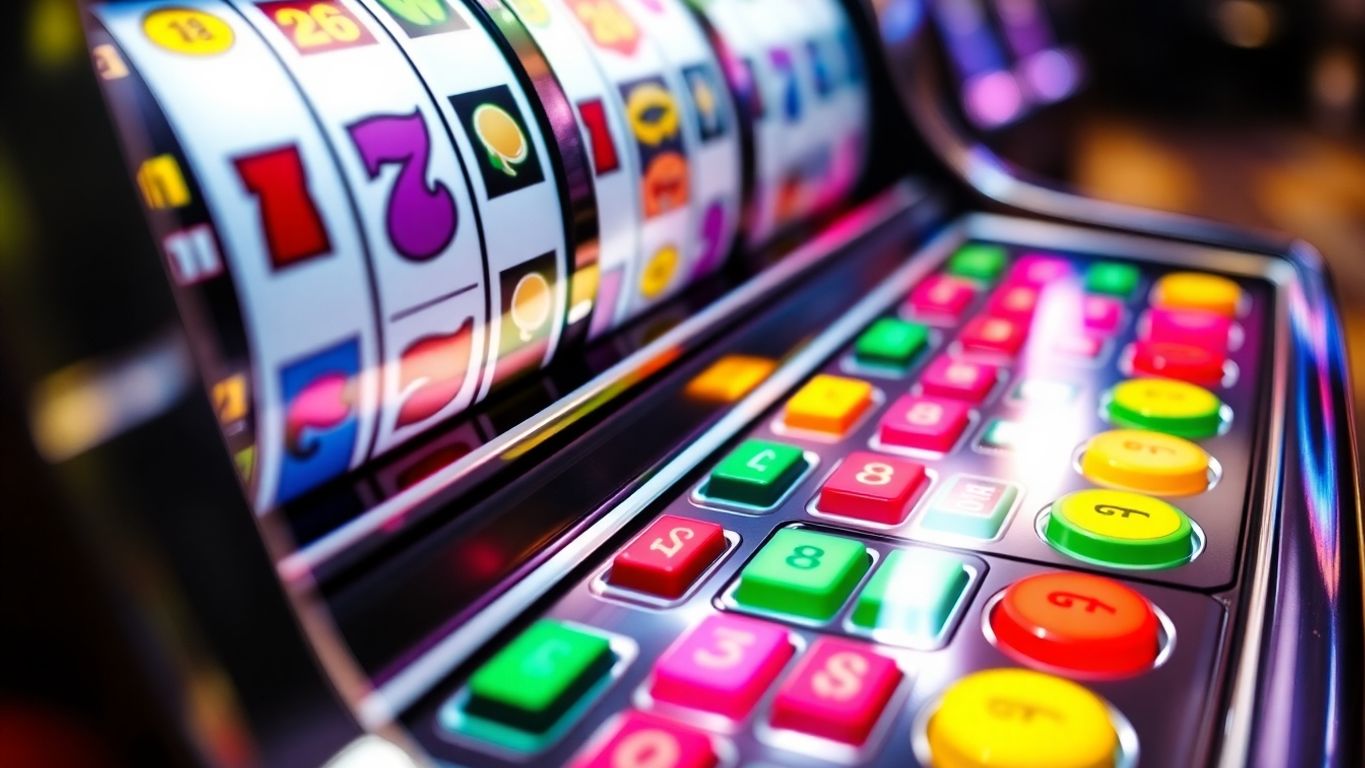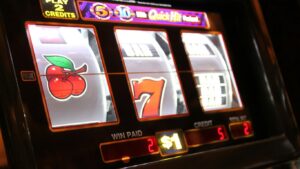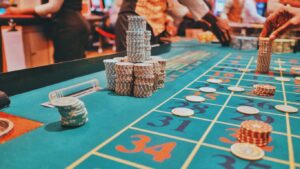Exploring The Definition Of Slot In Meaning
General Definition
The word "slot" can mean a lot of different things depending on where you use it. At its core, a slot is a narrow opening or groove. You might think of it like the slit where you drop coins into a vending machine or mail through a door. But, the term goes beyond just physical openings. It also refers to time slots, like when a TV show airs or when your flight is scheduled to land. In these cases, it’s more about a specific period reserved for something to happen.
Contextual Variations
In different settings, "slot" takes on unique meanings. For instance, in scheduling, a slot is a designated time for an event or activity. In a computer, a slot might be a socket where you can insert a circuit board. And then there’s the gambling world, where slots are those machines you see in casinos, tempting you with the chance of a big win. Each context gives the word "slot" a slightly different twist, showing just how flexible language can be.
Etymology and Evolution
The origin of "slot" is quite fascinating. It comes from the Old French word "esclot," which meant a hoofprint or hollow. Over time, it evolved to describe narrow openings and eventually expanded to include various metaphorical uses. The idea of a "slot" as a time or position came later, reflecting the concept of fitting something into a specific space or order. This evolution highlights how language adapts to new ideas and technologies, constantly reshaping itself to stay relevant.
Different Contexts Of Slot In Meaning
In Gambling
When people think about slots in gambling, they often picture those noisy, colorful machines in casinos. These are slot machines, sometimes called "one-armed bandits." They’re a big part of gambling culture because they’re easy to play and can lead to big wins. Slot machines have evolved over time, from the classic three-reel machines to more complex video and progressive slots that can be found both in physical casinos and online. Each type offers a unique experience, with video slots featuring engaging graphics and progressive slots offering huge jackpots that grow until someone wins.
In Scheduling
In everyday life, slots are often used to describe specific times set aside for activities. Whether it’s a TV show that airs at a certain time or a meeting scheduled in a calendar, slots help organize our busy lives. For instance, in the world of scheduling, finding the right slot can be crucial for managing time effectively. Businesses often rely on time slots to arrange meetings, interviews, and other events efficiently, ensuring that everything runs smoothly.
In Technology
In the tech world, slots have a different meaning altogether. They’re often used to refer to spaces in computers where components can be inserted. For example, expansion slots in PCs allow users to add new hardware like graphics cards or additional memory. This modularity is key for customizing and upgrading computers to meet specific needs. In programming, slots can refer to placeholders or positions in code where specific values or functions can be inserted, making the code more flexible and adaptable.
The Role Of Slot In Linguistic Structures
Grammatical Slots
In the world of grammar, slots are like placeholders in a sentence. They allow for different words or phrases to be inserted, changing the meaning or function of the sentence. This is especially useful in understanding how languages can be both flexible and structured. For instance, in English, you can swap out nouns or verbs in a sentence slot to modify its meaning. Grammatical slots are essential for creating varied yet coherent sentences.
Interchangeable Units
Slots in language also refer to interchangeable units, which means you can swap one word or phrase for another without losing the overall meaning. This is often seen in template-based language learning, where students learn to substitute words in a sentence structure. This concept is crucial in language teaching, helping learners understand sentence construction and variability.
Slot Grammar
Slot grammar is a linguistic theory that uses slots to represent grammatical functions. Developed by linguists to simplify the understanding of sentence structures, it provides a framework where different elements of a sentence are slotted into specific roles. This approach is particularly useful in computational linguistics and language processing, where understanding the role of each word in a sentence is necessary for Chomsky’s generative grammar and other linguistic models. Slot grammar helps linguists and computer scientists break down complex sentences into understandable parts, making it easier to analyze and generate language.
Types Of Slots In Gaming
Classic Slots
Classic slots are like a trip down memory lane. These are the old-school machines with three reels and symbols like fruits, bars, and sevens. They usually have just one payline, making them super easy to play. If you’re into that retro vibe, these are for you. They’re perfect for beginners or anyone who loves the simplicity of classic slot games.
Video Slots
Video slots are where things start to get interesting. They take the basic idea of classic slots and add a ton of flair. With five reels and multiple paylines, these games are all about variety. Plus, they come with cool bonus features like free spins, wild symbols, and multipliers. That’s why video slots are a big hit, especially online.
Progressive Slots
Ever dreamt of hitting a jackpot that could change your life? That’s what progressive slots are all about. These slots link up multiple machines or casinos, so every bet adds to a massive jackpot. It keeps growing until someone wins. Games like Mega Moolah are famous for their huge payouts.
3D Slots
3D slots take video slots to the next level with amazing graphics and animations. They often have storylines and interactive bonus rounds, making them more engaging. It’s like playing a video game and a slot machine all in one. If you want an immersive experience, 3D slots are the way to go.
Understanding Slot Machines
History Of Slot Machines
Slot machines have been around for quite a while, dating back to the late 19th century. The first known slot machine, called the Liberty Bell, was invented by Charles Fey in San Francisco in 1895. It featured three spinning reels with symbols like horseshoes, stars, and the Liberty Bell itself. This simple machine laid the groundwork for what would become a global sensation. Over the years, slot machines have evolved from mechanical devices to electronic wonders, and now to digital platforms. They’re not just found in casinos anymore; online slots have made it possible to play from the comfort of your home.
Mechanics Of Slot Machines
At its core, a slot machine is a gambling device. You put in coins or tokens, pull a lever or push a button, and watch the reels spin. Each reel is covered in symbols, and if they line up just right, you win! Modern slot machines use random number generators to determine the outcome of each spin, ensuring fairness and unpredictability. The mechanics have become more complex with the addition of multiple paylines, bonus rounds, and special features like wilds and scatters, but the basic idea remains the same: line up the symbols and win big.
Popular Slot Games
There are countless slot games out there, each offering something unique. Here’s a quick look at a few popular types:
- Classic Slots: These are the traditional three-reel games with simple symbols like fruits and bars. They’re great for beginners or anyone who enjoys a straightforward game.
- Video Slots: These are the most common type in online casinos. They feature five reels, multiple paylines, and often include bonus games and special features.
- Progressive Slots: These games offer jackpots that grow with each play until someone hits the big one. They can reach into the millions, making them very enticing.
- 3D Slots: With advanced graphics and animations, these games offer a more immersive experience. They often have storylines and interactive bonus rounds that keep players engaged.
Slot machines, whether in a casino or online, continue to captivate players worldwide. Their simplicity, combined with the potential for big wins, makes them a favorite for many.
The Importance Of Slot In Scheduling
Time Slots In Media
In the world of media, time slots are everything. Think about your favorite TV shows or radio programs—they’re slotted into specific times for a reason. These slots are carefully chosen to capture the largest possible audience. Prime time slots, usually in the evening, are golden because that’s when most people are free to tune in. Advertisers pay top dollar for these slots, knowing they’ll reach more eyes and ears. It’s not just about filling the airwaves; it’s about strategic placement to maximize viewership and, ultimately, profit.
Scheduling In Business
When it comes to business, scheduling is like the backbone of operations. Imagine a construction company that needs to manage different projects. They have to thoughtfully schedule construction slots to effectively manage a network of preferred trades and suppliers. This means coordinating everything from labor to materials, all while staying on budget and meeting deadlines. In the corporate world, meeting slots are equally crucial. Booking a meeting room or securing a time with a busy executive requires strategic planning. The right slot can mean the difference between a productive session and a missed opportunity.
Impact On Productivity
Productivity hinges on effective scheduling. Think about how your day goes when you have a clear schedule versus when you’re winging it. Time slots help organize tasks, ensuring that everything gets done without overlap or chaos. In workplaces, this means allocating specific times for meetings, work sessions, and breaks. The idea is to create a rhythm that keeps everyone on track. By sticking to designated slots, teams can avoid burnout and maintain a steady workflow. It’s all about balance—ensuring that there’s enough time for work, rest, and everything in between.
Slot In Meaning Within Hierarchical Structures
Positioning In Organizations
In any organization, the concept of a "slot" is critical. It refers to the specific position or role that an individual occupies. Think of it like a puzzle piece fitting perfectly into a larger picture. Each slot, or position, has its own responsibilities and expectations. When you’re slotted into a role, it means you’re taking on specific duties that contribute to the organization’s goals. This is important because it ensures that all tasks are covered and that everyone knows what they’re supposed to be doing. It’s like a well-oiled machine where every part has a function.
Competitive Slots
In competitive environments, slots are often limited and highly sought after. Whether it’s a spot on a sports team, a role in a company, or a position in a prestigious program, the number of available slots can dictate the level of competition. For example, only a few slots might be open for a promotion, leading to fierce competition among employees. This competition can drive individuals to improve their skills and performance. However, it can also lead to stress and burnout if not managed properly.
Cultural Significance
Slots also hold cultural significance, particularly in how they represent hierarchy and status. In many cultures, the slot you occupy can influence your social standing and how others perceive you. This can be seen in traditional societies where family roles are clearly defined, or in corporate cultures where one’s title can affect their influence and authority. Understanding the cultural context of slots helps us see why certain positions are more valued than others. It’s a reflection of societal values and norms, showing us what’s prioritized in different communities.
For more on how slots function within cognitive processes, particularly in managing velocity signals and observations, check out the hierarchical slot model in cognitive processing.
Technological Applications Of Slot
Expansion Slots In Computers
In the realm of computers, expansion slots are crucial. These slots are found on the motherboard and allow users to add extra hardware capabilities to their systems. You might need them to upgrade your graphics card, sound card, or even add network capabilities. Expansion slots have evolved over the years from the older ISA slots to the more modern PCI and PCIe slots, offering faster data transfer rates and increased compatibility with various hardware components.
Slots In Programming
In programming, slots refer to predefined spaces or placeholders within a program’s structure. These are often used in languages like Python and Ruby to manage memory efficiently or to define the structure of objects. Slots can restrict the attributes that an object can have, which can help in optimizing memory usage and enhancing program performance.
Virtual Slots
Virtual slots have become a significant part of online gaming and digital entertainment. Unlike physical slot machines, virtual slots are software-based and can be found in various online platforms. They offer a wide range of themes and gameplay mechanics, from traditional fruit machines to complex video slots with multiple paylines and bonus features. With advancements in mobile gaming and virtual reality, these slots have become more immersive, providing players with engaging experiences and enhanced security features through blockchain technology.
Cultural References To Slot In Meaning
Slot In Literature
Slots have made their way into literature in various forms. Whether it’s a metaphor for a narrow escape or a literal reference to a coin-operated machine, slots add a unique flavor to storytelling. Authors often use slots to symbolize chance, fate, or the randomness of life. Imagine a character standing in front of a slot machine, each pull of the lever representing a gamble not just with money, but with destiny itself.
Slot In Film
In the world of cinema, slots are more than just props; they often play a pivotal role in plot development. Films like "Casino" and "Ocean’s Eleven" showcase the allure and risk associated with slot machines. These movies highlight the tension and excitement that slots bring to the table, often serving as a backdrop for character development and dramatic twists. Slots in films can symbolize the unpredictability of life, where one moment you’re winning big, and the next, you’ve lost it all.
Slot In Music
Music, too, has embraced the concept of slots, often using them as metaphors in lyrics. Songs about gambling, chance, and luck frequently mention slots, capturing the essence of taking risks and the thrill of the unknown. The rhythmic sound of coins dropping and reels spinning can even inspire the beats and tempo of a song, creating a sonic representation of the gambling experience. Slots in music remind us of the highs and lows of life, much like the unpredictable nature of a slot machine.
Slots have permeated various cultural mediums, each offering a unique perspective on this seemingly simple concept. From the pages of a book to the silver screen, and even in the melodies we listen to, slots continue to fascinate and inspire.
Conclusion
So, there you have it. The word "slot" isn’t just about a place to drop your coins or a time on your calendar. It’s a versatile term that pops up in all sorts of places, from the world of gambling to the tech realm and even in our daily schedules. Whether you’re talking about a slot machine at a casino, a time slot for your favorite TV show, or a slot in a computer for extra memory, each use of the word carries its own unique twist. Understanding these different meanings helps us see how language evolves and adapts to our needs. It’s pretty fascinating when you think about it, right? So next time you hear someone mention a slot, you’ll know there’s more to it than meets the eye.
Frequently Asked Questions
What is a slot?
A slot is a small opening or groove where you can insert things like coins or mail. It can also mean a spot on a schedule or a position in a group.
How are slots used in casinos?
In casinos, slots refer to slot machines, which are games where you can win money by spinning reels with symbols.
What are different types of slot machines?
There are classic slots with three reels, video slots with more features, progressive slots with big jackpots, and 3D slots with cool graphics.
How do slots work in scheduling?
Slots in scheduling are specific times set aside for events or activities, like a TV show time slot or a meeting time.
What is a slot in technology?
In technology, a slot can be a place on a computer where you can add extra parts, like a memory card.
How do slots relate to language?
In language, a slot is a spot in a sentence where different words or phrases can fit, like a subject or verb slot.
Why are slots important in business?
Slots in business are important for planning and organizing tasks or meetings to make sure everything runs smoothly.
What is the history of slot machines?
Slot machines started in the late 1800s as simple coin-operated games and have become popular entertainment in casinos worldwide.









